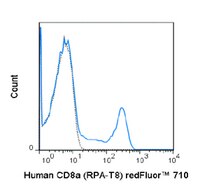MABF1696 Sigma-AldrichAnti-CD8a (human), redFluor™ 710, clone RPA-T8 Antibody
This mouse monoclonal Anti-CD8a Antibody (human), redFluor™ 710, clone RPA-T8, Cat. No. MABF16965 is validated for use in Flow Cytometry, for the detection of CD8a.
More>> This mouse monoclonal Anti-CD8a Antibody (human), redFluor™ 710, clone RPA-T8, Cat. No. MABF16965 is validated for use in Flow Cytometry, for the detection of CD8a. Less<<Recommended Products
Overview
| Replacement Information |
|---|
Key Spec Table
| Species Reactivity | Key Applications | Host | Format | Antibody Type |
|---|---|---|---|---|
| H | FC | M | redFluor™ 710 | Monoclonal Antibody |
| References |
|---|
| Product Information | |
|---|---|
| Format | redFluor™ 710 |
| Presentation | Purified Mouse monoclonal containing 10 mM NaH2PO4, 150 mM NaCl, 0.09% NaN3, 0.1% gelatin, pH7.2. |
| Quality Level | MQ100 |
| Physicochemical Information |
|---|
| Dimensions |
|---|
| Materials Information |
|---|
| Toxicological Information |
|---|
| Safety Information according to GHS |
|---|
| Safety Information |
|---|
| Packaging Information | |
|---|---|
| Material Size | 100 tests |
| Transport Information |
|---|
| Supplemental Information |
|---|
| Specifications |
|---|
| Global Trade Item Number | |
|---|---|
| Catalogue Number | GTIN |
| MABF1696 | 04055977290028 |
Documentation
Anti-CD8a (human), redFluor™ 710, clone RPA-T8 Antibody SDS
| Title |
|---|
Anti-CD8a (human), redFluor™ 710, clone RPA-T8 Antibody Certificates of Analysis
| Title | Lot Number |
|---|---|
| Anti-CD8a (human), redFluor 710, clone RPA-T8 -QVP1508050 | QVP1508050 |







